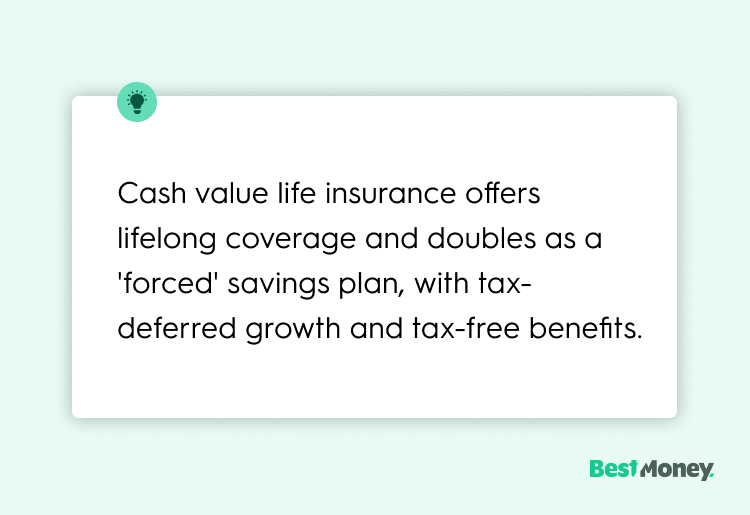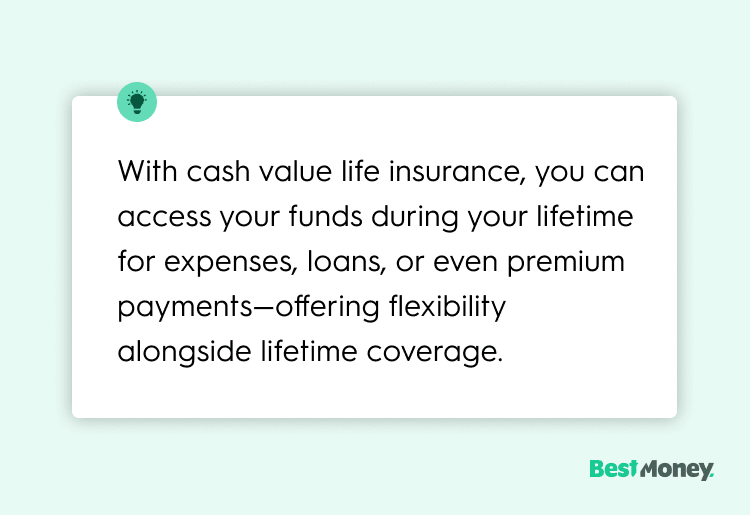
While some of our best life insurance companies focus on standard term policies, this permanent insurance option offers protection and lifetime access to your money. If you're wondering how cash-value life insurance can fit into your long-term financial planning, including its benefits and drawbacks, here's what to know.
What is Cash Value Life Insurance?
Cash value life insurance is a form of permanent life insurance that provides lifelong coverage, unlike term policies that expire after a set number of years. Because of the extended coverage period, premiums tend to be higher than standard term insurance. However, these higher costs serve a dual purpose.
When you pay your premiums with a cash value policy, your money is split between two components: the death benefit coverage and a cash value account. This account can grow over time through interest earnings or investment returns, depending on your chosen policy.
According to the Insurance Information Institute, many people prioritize paying their life insurance premiums, making cash-value policies a useful way to establish a "forced" savings plan. Additionally, the interest earned on these policies grows tax-deferred and can be received tax-free if it's paid out as a death benefit.

How Cash Value Life Insurance Works
Your policy's cash value component can be accessed in several ways during your lifetime. You can use it to:
Lower your premium payments
Make a withdrawal for major expenses
Take out a low-interest loan for big purchases like a home down payment or a new car
While policy loans come with attractive interest rates and aren't taxed, you need to remember that borrowing will typically reduce your death benefit.
However, if you don't use the cash value during your lifetime, it usually reverts to the insurance company when you pass away. For example, if you have a $50,000 death benefit and have built up $7,500 in cash value, your beneficiaries will receive the $50,000 death benefit while the insurance company keeps the $7,500 cash value.
How Can I Access the Cash Value of My Life Insurance Policy?
Your access to the cash value portion of your policy depends on its specific structure. Before making any decisions, consult with your insurance company about your available options. Remember that depleting your policy's cash value could cause your insurance to lapse.
Here are the main ways you can typically access your policy's cash value:
Withdrawal: You might be able to make a tax-free withdrawal from your policy, though again, it depends on how it’s structured. If the amount you withdraw exceeds the cash value you’ve accumulated, it might be taxed as ordinary income.
Loan: You could also take out a loan against your life insurance, and your loan will generally have a fairly low interest rate. Unlike traditional loans, there's no credit check since your policy serves as collateral.
Use it for premiums: Retirees often use their accumulated cash value to pay the premiums on their policy, which helps them keep more of their income in their pocket.
Surrender: As a last resort, you can surrender your policy to access its cash value. This cancels your coverage and typically incurs surrender fees. Remember that surrendering means your beneficiaries won't receive a death benefit.

Types of Life Insurance Policies with Cash Value
As mentioned, cash-value life insurance is permanent life insurance. Your policy will generally remain active for your entire life as long as you pay your premiums. That said, there are a few different types of permanent life insurance, and here’s a quick summary of how each works:
Whole life: Many people wonder about the difference between term and whole life insurance. With whole life, you pay level premiums, and your beneficiaries receive a set death benefit. The cash value portion of a whole-life policy is added to a savings account, and your balance will earn interest.
Universal life: With universal life insurance, you can modify your premiums (within reason) to suit your budget. The cash value component of universal life insurance is added to a savings account that earns interest.
Variable universal life: With variable universal life insurance, you can modify your death benefit. A lower death benefit will typically result in lower premiums, though your beneficiaries will receive a lower payout if you die. Cash value is invested, generally in mutual funds, stocks, or bonds, and you choose the asset allocation.
What are the Pros and Cons of Cash Value Life Insurance?
Pros | Cons |
|---|---|
Access to funds during your lifetime through withdrawals or loans | Higher premiums compared to term life insurance |
Lifetime coverage as long as premiums are paid and cash value is maintained | Withdrawals from cash value reduce your death benefit |
Tax-deferred growth on interest and investment gains | Takes several years of premium payments to build meaningful cash value |
Tax-free death benefit for beneficiaries, like all life insurance policies | Insurance company, not your beneficiaries, keeps any unused cash value after death |
Bottom Line
Permanent life insurance with a cash value component could be a good choice if you want lifelong coverage. However, it's relatively expensive, and for many people, term life insurance is a more affordable alternative, often available for up to 30 years. To make the best decision for your situation, use our life insurance calculator to estimate your needs, get quotes from multiple providers, and carefully consider your long-term financial goals.








.20210802061955.svg)